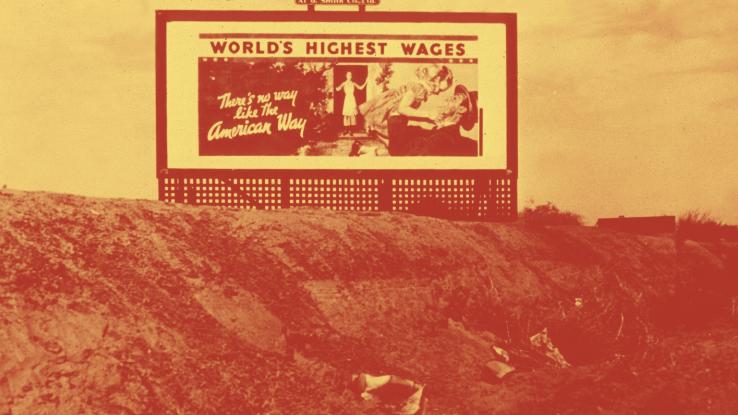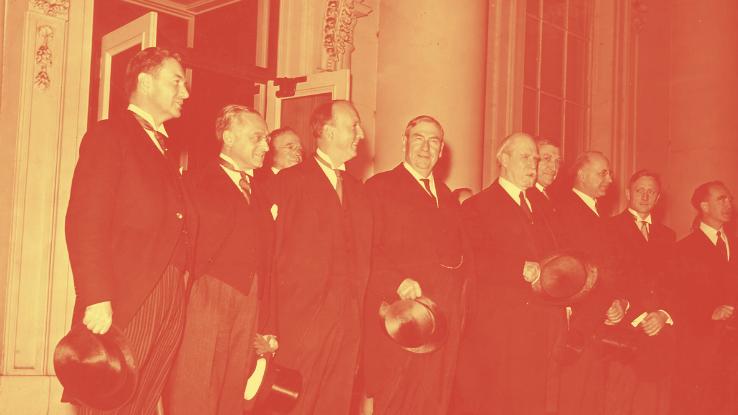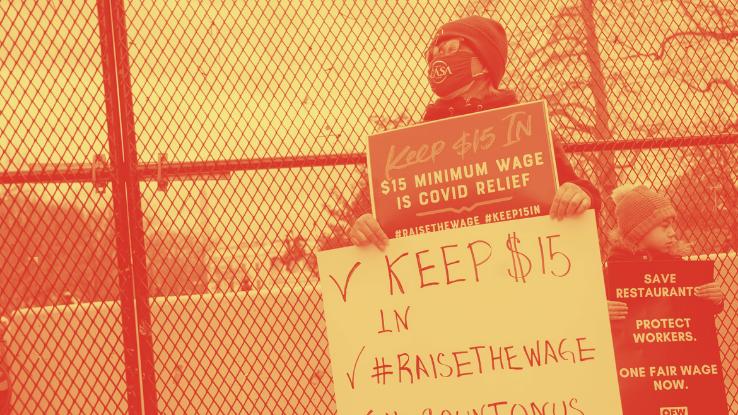how do i find out who is garnishing my wages

In 1938, Congress passed the Fair Labor Standards Act. This legislation affirmed that workers are entitled to a sure amount of compensation for their labor by instituting the outset federal minimum wage in the United States. But the conversation didn't end there. In fact, since its introduction, the federal minimum wage has been raised 22 times. Fifty-fifty today, minimum wage — which isn't inherently adapted to reflect higher costs of living — remains a hotly debated topic.
While the 1938 legislation marked an important first in U.S. history, laborers' push for a fair minimum wage actually had its modern-twenty-four hours origins in France a century before. In 1831, silk manufacture workers in Lyon went on strike, demanding a livable minimum wage. Over sixty years later, New Zealand became the first nation to institute a federal minimum wage with its 1894 Industrial Conciliation and Arbitration Act. In observance of National Poverty Sensation Month, we'll discuss the history of the federal minimum wage and its numerous changes.
The History of the Federal Minimum Wage in the United states
New Zealand's deportment helped inspire minimum wage advocates in the United States. According to History, "Samuel Gompers, founding president of the American Federation of Labor, publishe[d] an article entitled 'A Minimum Living Wage,' in which he advocates not just setting a legal threshold for wages, but also requiring it to exist enough for workers to live." Needless to say, this article marked a turning signal in the U.South.

Finally, 14 years later Gompers' article cracked the conversation wide open, Massachusetts enacted the commencement minimum wage law in the U.S. By the following yr, eight other states, from California to Minnesota, followed accommodate. Withal, a setback came in 1923 when the U.S. Supreme Court ruled that a state authorities could non gear up a minimum wage; according to the Court, doing so would violate a precedent set along in the Fifth Subpoena.
Just a decade later on, Americans institute themselves navigating the Great Depression. In an endeavour to help workers and rebuild the economic system, President Franklin D. Roosevelt rallied Congress to support the National Industrial Recovery Human activity (NIRA), which "suspends antitrust restrictions and allows industries to enforce their own fair-trade codes" (via History). Additionally, FDR encouraged employers to pledge to offer $12 to $fifteen weekly wages; in commutation, employers would be able to brandish "We Practice Our Function" badges, reinforcing the sense of pride and patriotism the federal government was hoping to inspire in the face up of the Great Depression (and, afterwards, World War Two). In the end, these efforts encouraged various industries to enact minimum wage codes.
In 1935, the NIRA codes faced pushback from the Supreme Court, which, in turn, made minimum wage the hot-button issue of the upcoming presidential election. Yet, things took a real turn in 1937 when Elsie Parrish, a maid at the Cascadian Hotel in Wenatchee, Washington, sued her former employer on the grounds that she was owed back pay in accordance with Washington's weekly minimum wage law. Since the Courtroom had previously ruled that "any grade of law establishing wages" was unconstitutional, the ruling on W Coast Hotel Co. five. Parrish came as a shock. Described by historians equally the "big switch," the Court ruled in favor of Parrish — and Washington'southward minimum wage laws.
This landmark ruling opened the door for Congress to laissez passer the Fair Labor Standards Act, which formally established a federal minimum wage. At the fourth dimension, that minimum wage was 25 cents per hr; by 1949, Congress raised the minimum to 75 cents, mark the starting time of the 22 increases.
Today, the federal minimum wage applies to workers who are employed by businesses that make at least $500,000 in revenue too every bit folks who work in schools, hospitals, nursing homes, and regime agencies. Additionally, workers who are involved in "interstate commerce" are also subject to minimum wage protections (via U.S. Department of Labor).

Although things have certainly inverse over the years, many feel the fight for establishing a off-white federal minimum wage is far from over. Every bit mentioned above, much of this feeling comes from the fact that the minimum wage doesn't automatically adjust based on increased costs of living. Equally of January 2022, the federal minimum wage is still gear up at $vii.25 — and has been since 2009. Meanwhile, the cost of living in the U.S. continues to climb.
More recently, attempts to account for these toll of living increases take been undertaken on a state-by-state basis. In 2016, both California and New York raised the minimum wage to $fifteen per hr (though it should be noted this increase to $15 is happening gradually). In total, 29 states (and Washington D.C.) have a higher minimum wage than the minimum prepare along by the federal government, and, of those states, 8 of them enhance those wages in accordance with increases in the cost of living.
Now, the COVID-19 pandemic has further emphasized the fact that many workers practise not make enough money to afford basic necessities, like rent, food and healthcare-related expenses. And so, what's being done? On February 27, 2021, the U.Due south. House of Representatives passed the American Rescue Programme Human activity of 2021, a $1.9 trillion COVID-19 relief package that aims to extend unemployment benefits; provide aid to modest businesses and nonprofits; cut $1,400 relief checks to Americans; and, perchance surprisingly, introduce a $fifteen federal minimum wage.
Reportedly, this increase, which would happen gradually until beingness fully realized in 2025, would have "additional pay for some 32 meg workers" (via CNBC). We say "would have" because in the first few days of March, equally the American Rescue Program Human activity moved to the Senate, the minimum wage provision was scrapped. Co-ordinate to Senate parliamentarian Elizabeth MacDonough, the provision did not comply with the rules of budget reconciliation.
While some Democrats have urged Vice President Kamala Harris to overrule MacDonough, it doesn't seem like the White Business firm volition do then, despite previously supporting a minimum wage increase. For now, information technology seems like a federal minimum wage increase is off the tabular array, but it's clear that lawmakers — and everyday Americans — won't finish fighting for it. Moreover, many states are raising their minimum wage rates irrespective of federal policies.
Source: https://www.reference.com/business-finance/federal-minimum-wage-3fcaa76aed287408?utm_content=params%3Ao%3D740005%26ad%3DdirN%26qo%3DserpIndex
Posted by: sheppardforgiagether.blogspot.com

0 Response to "how do i find out who is garnishing my wages"
Post a Comment